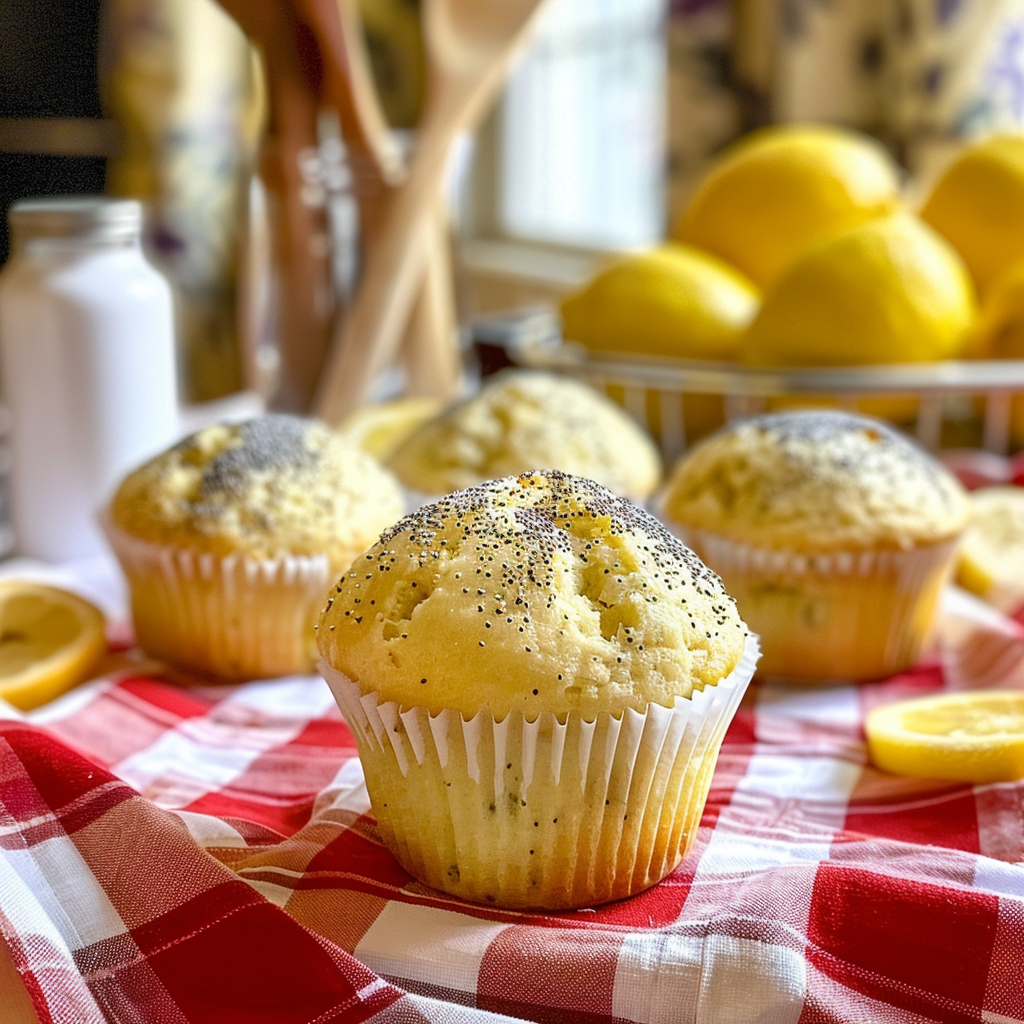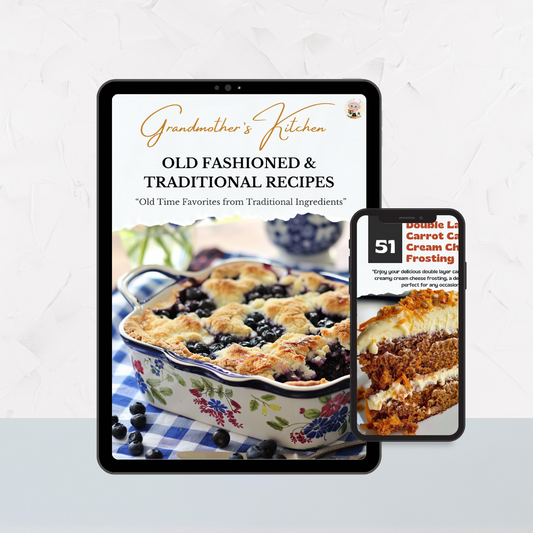Perfectly Baked Lemon Poppy Seed Muffins: A Citrusy Delight

Share
Lemon Poppy Seed Muffins: A Bright Citrusy Flavor
Muffins are one of those simple pleasures that can make any morning feel special. There’s nothing quite like enjoying a fresh, warm muffin with your coffee or tea. Over the years, I’ve experimented with various muffin recipes, and one of my all-time favorites has become the lemon poppy seed variety. The tangy brightness of lemon combined with the subtle crunch of poppy seeds is a winning combination that always delights. I’ve learned a few tricks along the way to make sure my muffins turn out just right. One of the most important is ensuring they’re all the same size. This isn’t just about presentation—it’s also key to making sure they bake evenly. I use an ice cream scoop to divide the batter evenly among the muffin cups, which makes a big difference. When all the muffins are the same size, they bake up perfectly, with no overbaked or underbaked spots. It’s a small detail, but it really helps make each batch of muffins as delicious as possible.
Did You Know?
Poppy seeds are more than just a flavorful addition to your recipes—they pack a nutritional punch as well. These tiny seeds are rich in dietary fiber, which aids in digestion, and they provide a good source of essential minerals like calcium, iron, and zinc. Calcium supports bone health, iron is vital for blood production, and zinc plays a crucial role in immune function. Additionally, poppy seeds contain B vitamins, including thiamine, which helps convert food into energy. Incorporating poppy seeds into your diet, like in these lemon poppy seed muffins, adds both texture and nutritional benefits, making them a wholesome choice for any occasion.
Yield:
12 muffins
Ingredients:
1 3/4 cups all-purpose flour
1/4 cup poppy seeds
1 cup sugar
2 teaspoons baking powder
1/2 teaspoon baking soda
1/4 teaspoon salt
3/4 cup milk (dairy or non-dairy)
1/4 cup lemon juice (freshly squeezed)
1/2 cup vegetable oil or melted butter
2 large eggs
Zest of 2 lemons
Instructions:
Prepare the Batter:
Preheat your oven to 375°F (190°C). Grease a 12-cup muffin tin or line with paper liners.
In a large mixing bowl, combine the flour, poppy seeds, sugar, baking powder, baking soda, and salt. In another bowl, whisk together the milk, lemon juice, oil, eggs, lemon zest, and vanilla extract.
Pour the wet ingredients into the dry ingredients and stir until just combined.
Personal Tip: Do not overmix the batter, as it can result in dense muffins.
Bake the Muffins:
Divide the batter evenly among the prepared muffin cups, filling each about two-thirds full.
Personal Tip: Use an ice cream scoop to ensure all muffins are the same size, which helps them bake evenly.
Bake in the preheated oven for 18-20 minutes, or until a toothpick inserted into the center of a muffin comes out clean. Allow the muffins to cool in the tin for a few minutes before transferring them to a wire rack to cool completely.
Serve:
Serve warm or at room temperature. These muffins are delicious on their own or with a light lemon glaze.
Personal Tip: For an extra touch, drizzle a simple lemon glaze made from powdered sugar and lemon juice over the cooled muffins.
Nutritional Information (Per Muffin):
Calories: 220, Fat: 11g, Saturated Fat: 2g, Carbohydrates: 28g, Fiber: 1g, Sugars: 15g, Protein: 3g
Kitchen Tips, Great Ideas, How to Save Money:
- Bulk Buying: Purchase poppy seeds, sugar, and flour in bulk. These ingredients are staples in many baking recipes and buying in bulk can reduce the overall cost. Store them in airtight containers to keep them fresh and ready for use.
- Fresh Lemons: Buying fresh lemons can sometimes be more economical than bottled lemon juice, plus you get the added benefit of fresh zest. Look for sales on lemons and buy in larger quantities when they are at their best price. You can zest and juice the lemons, then freeze the zest and juice separately for future use.
- Dairy Alternatives: If milk is expensive or you prefer a dairy-free option, use non-dairy milk such as almond, soy, or oat milk. These alternatives often have a long shelf life and can be used in various recipes, making them a versatile choice.
- Homemade Muffin Liners: Make your own muffin liners using parchment paper. Cut squares of parchment paper and press them into the muffin tin, creating a rustic look. This saves money and reduces waste.
- Reusable Baking Tools: Invest in reusable silicone muffin cups. These cups are non-stick, easy to clean, and environmentally friendly. They also save money over time compared to disposable paper liners.
- Energy Efficiency: Bake multiple batches at once to make the most of your oven’s heat. This not only saves energy but also allows you to have extra muffins on hand for the week. Freeze any extras in an airtight container for future use.
- DIY Poppy Seeds: If you use poppy seeds frequently, consider buying them in bulk from a spice store or online. This can be more cost-effective than purchasing small amounts from the grocery store. Store them in a cool, dark place to maintain freshness.
- Smart Storage: Store leftover muffins in an airtight container at room temperature for up to three days. For longer storage, freeze the muffins individually wrapped in plastic wrap and then placed in a freezer bag. Reheat in the oven or microwave for a quick and easy snack.
- Ingredient Substitutions: If you’re out of vegetable oil or butter, use applesauce or mashed bananas as a substitute. These alternatives not only save money but also add a unique flavor and extra moisture to your muffins.
- Learning and Sharing: Engage with online baking communities for more tips and recipe ideas. Sharing your experiences and learning from others can make baking more enjoyable and economical. You can discover new techniques, ingredient substitutions, and creative ways to use pantry staples.
Let's Learn A Little About Poppy Seeds
Poppy seeds, derived from the opium poppy plant, have been used in cooking and baking for centuries. Despite their tiny size, they are packed with nutrients, including calcium, iron, and magnesium. They have a subtle, nutty flavor that pairs well with both sweet and savory dishes. In addition to their use in baking, poppy seeds are often used in salad dressings, sauces, and even as a topping for bread and bagels. When using poppy seeds, it's important to buy them fresh and store them properly to avoid rancidity, as their high oil content can cause them to spoil quickly.


